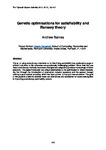Genetic optimisations for satisfiability and Ramsey theory
| dc.contributor.author | Barnes, A. | |
| dc.date.accessioned | 2019-05-20T16:10:35Z | |
| dc.date.available | 2019-05-20T16:10:35Z | |
| dc.date.issued | 2017 | |
| dc.identifier.citation |
Barnes, A. (2017) 'Genetic optimisations for satisfiability and Ramsey theory', The Plymouth Student Scientist, 10(2), p. 193-207. | en_US |
| dc.identifier.issn | 1754-2383 | |
| dc.identifier.uri | http://hdl.handle.net/10026.1/14165 | |
| dc.description.abstract |
The art of using evolutionary mechanisms for identifying satisfiability has produced a range of efficient solutions to this otherwise computationally challenging problem. Since their first use these evolutionary methods have been changed and adapted to produce increasingly efficient solutions. This paper introduces two unique alternatives to the optimisation of these methods, the first through the introduction of alternative mutation operators and the second through utilizing a grammatical encoding which has been proven to improve neuroevolution. The goal of this paper is to identify whether these two alternatives are candidates for future investigation in improving evolutionary satisfiability solvers. | en_US |
| dc.language.iso | en | en_US |
| dc.publisher | University of Plymouth | |
| dc.rights | Attribution 3.0 United States | * |
| dc.rights.uri | http://creativecommons.org/licenses/by/3.0/us/ | * |
| dc.subject | genetic optimisations | en_US |
| dc.subject | Ramsey theory | en_US |
| dc.subject | evolutionary methods | en_US |
| dc.subject | identifying satisfiability | en_US |
| dc.title | Genetic optimisations for satisfiability and Ramsey theory | en_US |
| dc.type | Article | |
| plymouth.issue | 2 | |
| plymouth.volume | 10 | |
| plymouth.journal | The Plymouth Student Scientist |



